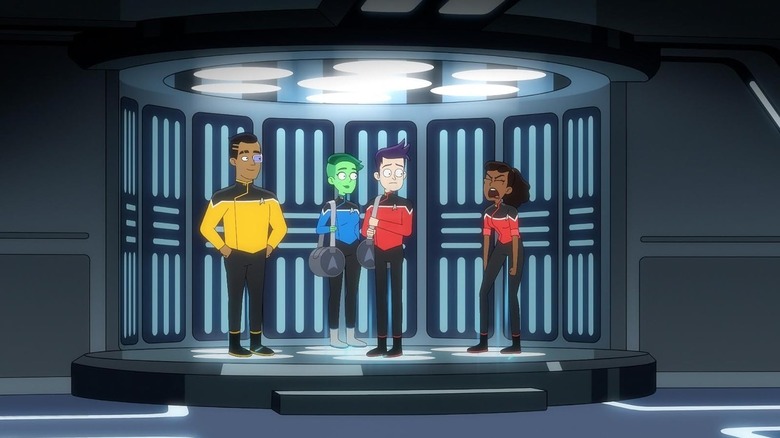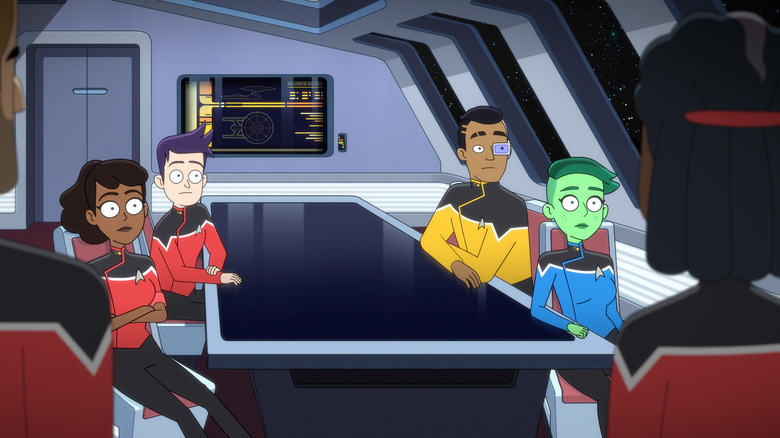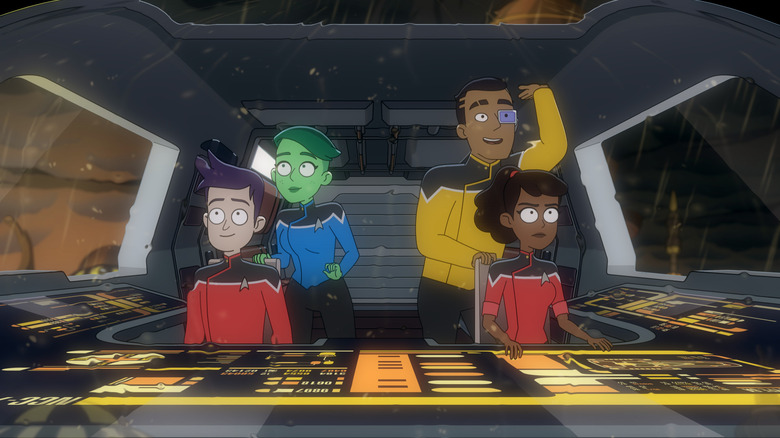Star Trek: Lower Decks Has Become A TV Show About Growing Up
Spoilers follow.
In the latest episode of "Star Trek: Lower Decks," called "Caves," Lieutenants Mariner (Tawny Newsome), Rutherford (Eugene Cordero), Tendi (Noël Wells), and Boimler (Jack Quaid) are assigned one of the most tedious of Starfleet missions: scanning the interior of a cave. Each of them notes that they have all gone on cave missions in the past, and that caves all kind of look the same. These comments are, of course, a clever Trekkie in-joke, calling to attention how often "Star Trek" would save money by filming in Paramount's cheap-looking cave set. As both the characters and the audience predict, there is a cave-in. The characters cannot communicate with their ship and have to survive in an enclosed space ... with what turns out to be flesh-eating moss.
While trapped, the quartet while away the hours recounting their old cave missions. Their stories, it comes out, all took place after the four characters had first met. Given that they are all good friends, they individually become a little hurt that their dramatic cave stories had not been shared earlier in their friendships. Why didn't Rutherford, for instance, reveal that he and the chief medical officer of the Cerritos, Dr. T'Ana (Gillian Vigman) raised an alien infant in a cave once? Or why didn't Boimler reveal that he became friends with a really obnoxious member of the crew during a cave mission?
One can rest assured that the four lieutenants will escape the cave intact. The drama arises from whether or not they'll still be friends at the end of the day. Are they ... growing apart? Do they have their own lives now, unseen and undiscussed by the others? When they were ensigns, the quartet shared everything. As lieutenants, they will have to work to find time together.
Career officers
Recall that Starfleet is a career. The four officers may like working together and clearly operate well as members of a crew, but they will always be beholden to the demands of their job. They happen to work on the same shift, but there's every reason for the Cerritos' senior staff to transfer any one of them to new shifts based on their expertise. They could live on the same ship and still not see each other for days — or even months — at a time.
It was easier, of course, for Mariner, Tendi, Boimler, and Rutherford to spend time as friends when they were ensigns and their work was menial. They slept in the same hallway and were in constant close contact. Now that they're all lieutenants, they are put in charge of missions, work on larger projects, and have their own quarters. The fact that they're not constantly conversing pulls into sharp relief just how much their friendships relied on their physical nearness. They may not have noticed it themselves — they would be too busy — their friendships are starting to loosen, to require work. They are moving from 20s friendships into ... late-20s friendships.
"Caves" is a story about their friendships being challenged. Boimler, Rutherford, Tendi, and Mariner have now acknowledged that they have adventures, intimate tales, and even other friendships that they don't tell each other about. This suddenly reveals that they're not as close as they were only a few months ago. And it distresses them.
They're growing up.
Their friendship is something worth fighting for. And, as such, it has become the central theme of the show. They may have a sucky job, but they have each other. That must be maintained.
The moments together
"Caves" closes with a story of the time, early in their friendships, when the central quartet became trapped on a turbolift for an extended period. They ended up getting out of their uniforms and napping with their heads resting on each other. It was the moment when the four of them truly bonded for the first time, the moment when they became friends. They look back on this moment with halcyon nostalgia, happy to have shared the early-career, youthful experience.
Cutting back to the present, the four of them huddle together in a cave and laugh about all the fun they have always had together. A nearby alien, unobserved, notes that Boimler, Tendi, Mariner, and Rutherford could likely try to use their comm badges and be rescued. Another alien looks on, seeing the laughter and the joy and the profound ineffable connection they share, and notes that they should be allowed this moment.
The alien knows what the audience knows: this joy is temporary. Like any workplace relationship, the love and intensity must be cherished before the rigors of careerism interrupt it. There's no way "Lower Decks" ends its run with the four characters in the same place, or even necessarily still in contact with each other. The nature of Starfleet will separate them, and they will continue to grow up, get promotions, and advance in their lives.
Growing up is exhilarating. You learn and evolve and have new emotional experiences you didn't know possible. Growing up also puts one in a constant state of letting go. Our characters will improve always, even if they eventually have to say goodbye.


